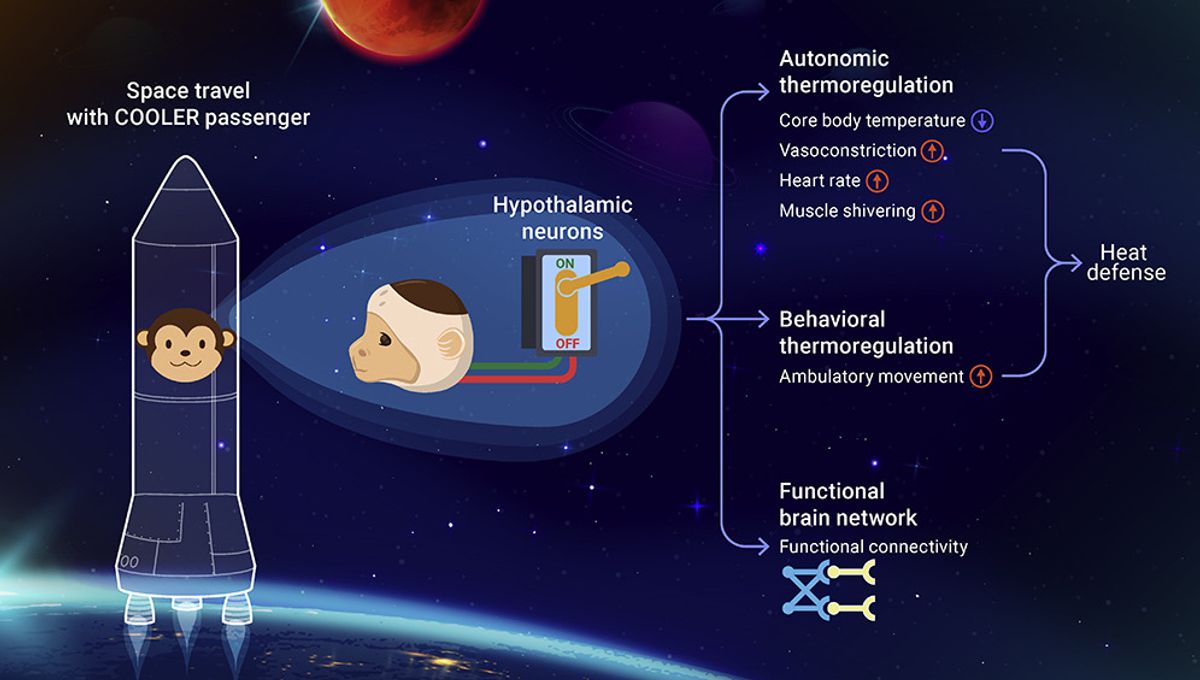
The core body temperatures of crab-eating macaques (Macaca fascicularis) have been reduced in warm conditions, purely by controlling their brains. The aim is to find a way to induce hibernation in monkeys, and eventually humans. Whether this justifies the suffering involved is obviously debatable, but the goal goes beyond missing the worst of winter. Instead, something like this may be the only practical way to undertake space missions beyond the Solar System.
Relativity Theory demonstrates the extreme difficulties in travelling between star systems, particularly in our loosely packed part of the galaxy. Barring shortcuts such as hyperspace, the difficulties in accelerating large objects to anything close to lightspeed mean journeys will take decades. Having the crew in something close to suspended animation most of the way may be the only way that will work.
Species like tardigrades have mastered the art of shutting down their bodily functions, but their biology is so different from our own it’s unlikely we could do anything similar. On the other hand, plenty of mammals conserve energy through the winter in ways we may hope to emulate. The list of hibernating mammals does not include our closest relatives, but a recent study hopes to change that.
A team led by Dr. Wang Hong and Dr. Dai Ji of the Chinese Academy of Sciences targeted part of the hypothalamus known as the preoptic area (POA) considered to control thermoregulation. The team infected the POA’s neurons with viruses that cause receptors to respond to certain drugs.
When the drugs were administered, the team observed the monkeys’ behavior and body functions such as heart rate, and tracked their brain functions using functional magnetic resonance imaging (fMRI). “This is the first fMRI study to investigate the brain-wide functional connections revealed by chemogenetic activation,” Dai said in a statement.
The process succeeded for both anesthetized and awake monkeys. Indeed, the anesthetized monkeys’ core body temperatures fell when their neurons were activated in this way, even when heat was applied externally. The authors attribute this to a legacy of our distant mammalian ancestors who hibernated. The POA controlled the process of cooling the body when the time came to shut down for the winter, the authors argue, and remnants of this capacity remain millions of years after it was last used.
“This work provides the first successful demonstration of hypothermia in a primate based on targeted neuronal manipulation,” Wang said. “With the growing passion for human spaceflight, this hypothermic monkey model is a milestone on the long path toward artificial hibernation.”
This doesn’t mean humans will be hibernating any time soon, however. The largest reduction was just 1.7°C, a long way short of what would be required to hibernate.
The process was also far less smooth than in many other mammals, including those, such as mice, that naturally hibernate only briefly. Instead of decreasing their activity and heart rates, the macaques shivered and moved more, sure signs the body was trying to keep its temperature up.
Inducing primate torpor is also only half the challenge – it needs to be sufficiently harmless that astronauts can face the dangers of new worlds afterwards.
The lack of primate hibernation has been attributed to the fact that, humans and Japanese macaques aside, no primates live far enough from the equator to get much benefit. However, it’s not clear which way causality runs. Perhaps primates didn’t colonize subpolar regions until our ancestors mastered fire because they’d lost the capacity to hibernate safely, and some evolutionary stumbling block prevented its recovery.
The paper is published in The Innovation.
Source Link: Neural Control Of Monkeys’ Body Temperatures Might Take Humanity To The Stars